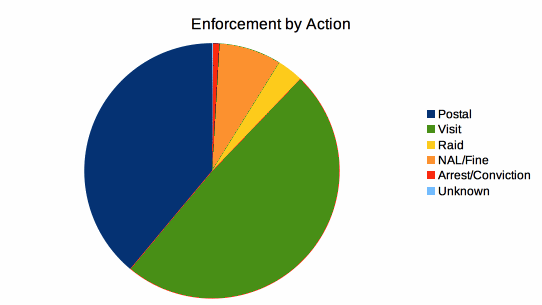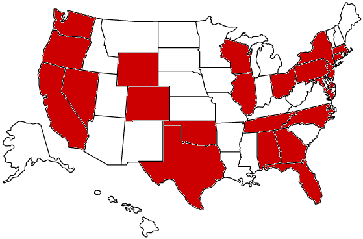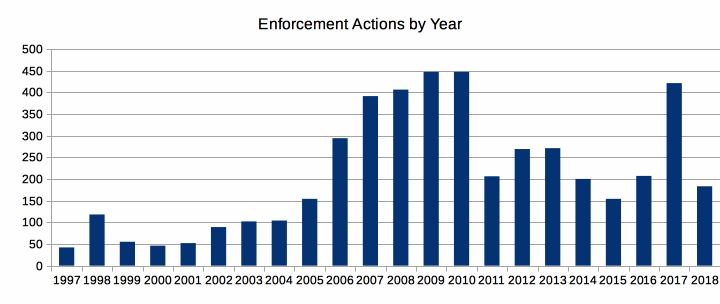In a highly-symbolic yet positive move last week, all five Federal Communications Commissioners told a House oversight hearing on FCC policies whether or not they support the creation of new low-power FM (LPFM) radio stations. The answer was unanimous: “yes, we will.”
So, all that now needs to happen is for Congress to pass the long-languishing Local Community Radio Act (80 cosponsors in the House, and seven in the Senate at last count), and new LPFM stations will bloom like flowers in springtime, right? Continue reading “Congress Supports LPFM, But Will It Move The FCC?”
Category: FCC
FCC Names New Top Cop
The new chief of the agency’s Enforcement Bureau is P. Michelle Ellison, who will assume her duties as of September 28.
Interestingly, Ms. Ellison was not part of the Enforcement Bureau (typically they like to promote from within their own bureaus). Instead, she’s a lawyer – (soon to be former) “Deputy General Counsel, a position she has held for the last twelve years, and most recently served as Acting General Counsel of the FCC through July 2009.” Continue reading “FCC Names New Top Cop”
Enforcement Action Update: Paper Still Beats Rock, Scissors
I caught up on the FCC’s enforcement actions against unlicensed broadcasters this weekend. The summer’s been kind of slow for field agents, though it doesn’t mean they’re not active: enforcement activity has been reported in 17 states this year, and stations both “new” and old are getting dimed.
 As you can see from the graph at right, the majority of enforcement actions continue to be administrative: of all the enforcement activity conducted by the FCC against pirate broadcasters since 1997, fully 82% have led to nothing stronger than a visit or warning-via-certified letter. Continue reading “Enforcement Action Update: Paper Still Beats Rock, Scissors”
As you can see from the graph at right, the majority of enforcement actions continue to be administrative: of all the enforcement activity conducted by the FCC against pirate broadcasters since 1997, fully 82% have led to nothing stronger than a visit or warning-via-certified letter. Continue reading “Enforcement Action Update: Paper Still Beats Rock, Scissors”
FCC: AM Stations Get FM Translators
Yesterday the FCC issued a ![]() Report and Order formally allowing AM radio stations to use FM translators to rebroadcast their signals.
Report and Order formally allowing AM radio stations to use FM translators to rebroadcast their signals.
The idea was first proposed nearly three years ago, and over the last 18 months or so the FCC’s quietly been allowing AM stations to apply for translators to “fill in” existing gaps in their coverage areas. These gaps have been caused by the general degradation of the AM band, due to electromagnetic or radio-frequency interference (RFI) from a growing myriad of electronic devices and skywave signals from stronger co- or adjacent-channel stations. Continue reading “FCC: AM Stations Get FM Translators”
LPFM: Offensive and Defensive Victories
Late last week, the D.C. Circuit Court of Appeals dismissed the National Association of Broadcasters’ appeal to have FCC-tweaks made over the years to the LPFM service thrown away. In a nutshell, the NAB claimed that the FCC’s moves to make LPFM stations more equal to others on the dial, and to provide remedial efforts in the case where an LPFM’s existence is in jeopardy by another (larger) station, overstepped the statutory bounds of the LPFM service as dictated by Congress in 2001.
In an 18-page ruling, the D.C. Circuit basically tells the NAB to stuff it: “Congress did not intend to restrain the Commission’s authority to respond to new circumstances potentially threatening LPFM stations other than with respect to third-adjacent channel minimum separation requirements.” Administratively, the Court could find no grounds to back the NAB’s objections. Radio World says the trade organization “is studying the decision and its options,” but the smart money is this horse is dead. Continue reading “LPFM: Offensive and Defensive Victories”
Enforcement Action Database Update
As part of a long-standing effort to get the legacy-projects of the site up to speed before delving into the dissertation, I’ve compiled the “final” statistics for the FCC’s enforcement actions in 2008 and brought the Enforcement Action Database up to-date for this year.
 Unfortunately, the agency just missed hitting the 400 mark with enforcement actions last year – though due to the various methods by which the Enforcement Bureau inflates its enforcement statistics, it’s safe to say that most likely fewer than 200 stations were actually “dimed” by the agency in some way last year. Continue reading “Enforcement Action Database Update”
Unfortunately, the agency just missed hitting the 400 mark with enforcement actions last year – though due to the various methods by which the Enforcement Bureau inflates its enforcement statistics, it’s safe to say that most likely fewer than 200 stations were actually “dimed” by the agency in some way last year. Continue reading “Enforcement Action Database Update”
Walk For Power Short-Circuits
Somehow, it seemed just too good to be true. Touch FM‘s founder, Charles Clemons, has abandoned his cross-country trek to raise awareness of low-power FM and the plight of microradio stations engaged in electronic civil disobedience. A ![]() press release posted to the Walk For Power web site cites logistical reasons for having to abandon the journey; feats like these take planning and somewhat north of a pretty penny, as well as a network of helpful associates in-place before you begin.
press release posted to the Walk For Power web site cites logistical reasons for having to abandon the journey; feats like these take planning and somewhat north of a pretty penny, as well as a network of helpful associates in-place before you begin.
Instead, says Clemons, “the road to L.A. is through Washington, D.C.,” and thus this past weekend he took again to the byways, to arrive in the nation’s capital on or around April 17. There, he will be greeted by the Prometheus Radio Project and Free Press, and will participate in a series of LPFM lobbying conferences and workshops later in the month. Continue reading “Walk For Power Short-Circuits”
The "War on Pirates" in 2008: Paper Beats Rock, Scissors
I’ve just finished updating the Enforcement Action Database. The FCC’s Enforcement Bureau has reported its field actions through mid-December, and as you can see, given any activity over the balance of the month, it is on target to meet and/or (most likely) beat the record enforcement year of 2007.
 What does this mean? It depends on how you look at the data. Sure, the FCC’s busting more pirates than ever, but does that really mean it’s making a dent in station proliferation? A couple of major conclusions from the year-in-review are striking: Continue reading “The "War on Pirates" in 2008: Paper Beats Rock, Scissors”
What does this mean? It depends on how you look at the data. Sure, the FCC’s busting more pirates than ever, but does that really mean it’s making a dent in station proliferation? A couple of major conclusions from the year-in-review are striking: Continue reading “The "War on Pirates" in 2008: Paper Beats Rock, Scissors”
FCC Allows Stealth HD Power Boosts
Although the Federal Communications Commission has deferred (for now) any formal action on its inquiry into whether or not to allow broadcast radio stations to increase the power of their digital (“HD”) sidebands by a factor of ten, the agency’s employing the tried and true method of “creating facts on the ground” by allowing individual stations (or station clusters) to individually apply for special temporary authority to hike their HD power levels. Continue reading “FCC Allows Stealth HD Power Boosts”
FCC Begs Off on Translator-Expansion (for now)
A pleasant surprise: last week, during the FCC’s monthly meeting, the Commission was to vote on a disastrous plan to give all AM stations a buttload of FM translators, gratis. However – and somewhat true to form for Chairman Kevin Martin’s tenure – the item was pulled from consideration at the last minute. An unnamed source within the FCC reportedly says this is not just a short-term delay; the FM translator giveaway is not slated to be on October’s agenda, either.
Some trade publication, whose name escapes me now (because I didn’t bookmark to their miniscule blurb on the subject), claims that it is the “forces of LPFM” which have delayed the translator giveaway. Not sure what that’s supposed to mean: the “forces of LPFM” are not nearly as organized as they were just a few short months ago, when they lost their most talented and driven public-interest lobbyist for greener pastures. This is a loss that, frankly, cannot be adequately replaced. Continue reading “FCC Begs Off on Translator-Expansion (for now)”